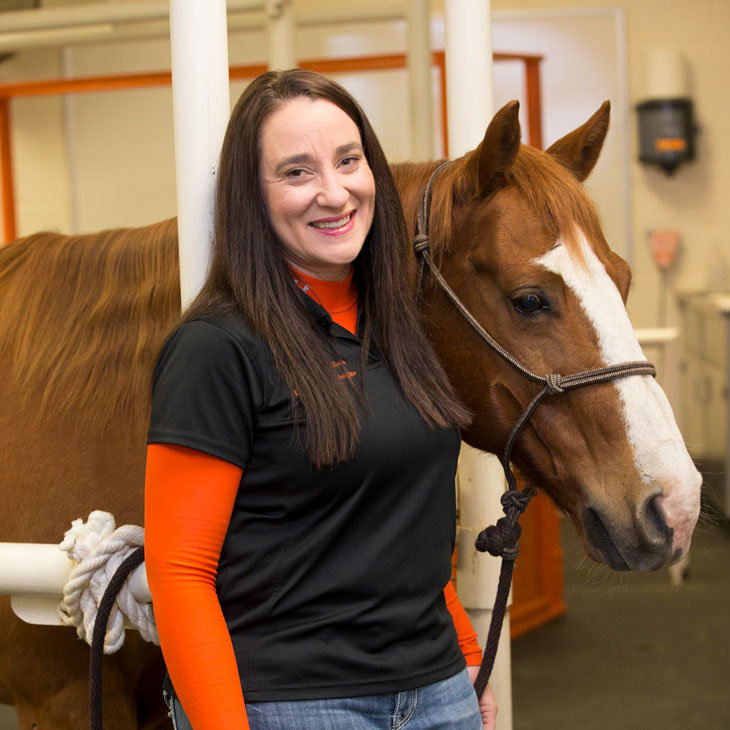
Vet Med Faces of Research: Dr. Lyndi Gilliam
Monday, February 3, 2020
Lyndi Gilliam, DVM, Ph.D., DACVIM, is an associate professor of equine internal medicine in the Department of Veterinary Clinical Sciences at Oklahoma State University’s College of Veterinary Medicine. In addition to treating patients at the college’s Veterinary Medical Hospital and teaching the next generation of veterinarians, Dr. Gilliam conducts research.
“As a clinical scientist I get the chance to research many different things,” said Gilliam. “My primary area of research is snake venom. Currently my biggest project is looking at a field antidote or field treatment that you could give to treat snake bite. This is probably one of the neatest research projects that I have had the opportunity to be involved in because it has such a direct impact on people and animals.”
According to Gilliam, snake bite is actually a world-wide crisis that is under recognized. In fact, the World Health Organization added snake bite back on its list of neglected tropical diseases.
“Many people don’t understand that 100,000 people will die this year alone from snake bite,” she said. “Hundreds of thousands more will be maimed or disfigured because of it. In the United States when we think about snake bite, I don’t think we realize that it’s a global crisis. It’s really important from a global perspective and I’m excited to be a part—a small part—of recognizing that.”
Gilliam has been conducting research since she began pursuing her Ph.D. in veterinary biomedical sciences about 15 years ago.
“I’ve always had a passion for helping people and animals, not just in our state or region but literally worldwide,” continued Gilliam. “It’s unusual to find that thing that can reach all those places. This project has allowed me to be part of something that I think can literally change the world. If I can be a part of hundreds of thousands of people having a fuller, happier life, that’s just incredible and super humbling for me.”
Gilliam refers to a website called “Minutes to Die” which documents the global snake bite crisis.
“The website gives people a perspective on what’s going on out there with snake bite, that it’s happening and that people are dying,” said Gilliam. “We know so little about how to treat snake bite. Our treatment has been around for years and years. We have to go to the hospital for specialized care. People in rural areas, where there is no refrigeration for the anti-venom or there are no hospitals to administer it in the vein, are dying. These people can die literally within minutes from a snake bite. They don’t have time to get to a hospital even if it is available. I want people to recognize what a crisis it is and how much more research we need in this area to find new treatments and move things forward.
“Success for me as a researcher is getting an answer to a question. It’s not always the answer that maybe I wanted or thought I was going to get but, nevertheless, it’s the answer to a question that we didn’t know before. To me that’s what research is about—answering small questions that hopefully help us answer a bigger question that impacts the world, the people, the animals, all the things around us.”
While some may find research intimidating, Dr. Gilliam has some advice for those considering a career in snake bite research.
“Snake bite research is just an open door. It’s been around since the dawn of time. It’s an exciting area to research. There’s still so much we don’t know about it and venom is so fascinating. You answer one question and there are 20 more to answer. It’s also a great place to meet people across the globe because a lot of snake bite research is happening in other countries.
“Research happens in many places from the person taking care of my animals all the way to the person running my lab tests to my husband and me working on the animals. There’s something really special about being part of a team that’s pushing the boundaries of knowledge. You’re pushing right up against what we know and hopefully expanding a little bit past that. As children we ask ‘why’ all the time. I would encourage people to keep asking why and looking for the answers. Because the only way we’re going to make our world a better place is to have those whys answered.”
Vet Med Faces of Research is a monthly series designed to inform the public about the impact of the numerous studies being conducted at Oklahoma State University’s College of Veterinary Medicine. Advancing knowledge and understanding for the benefit of the lives and livelihoods of the people of Oklahoma is a critical element of OSU’s land-grant mission.
MEDIA CONTACT: Taylor Bacon | Public Relations and Marketing Coordinator | 405-744-6728 | taylor.bacon@okstate.edu
